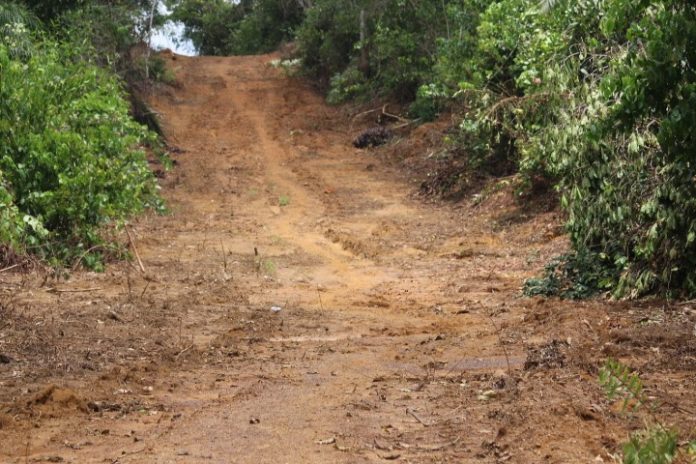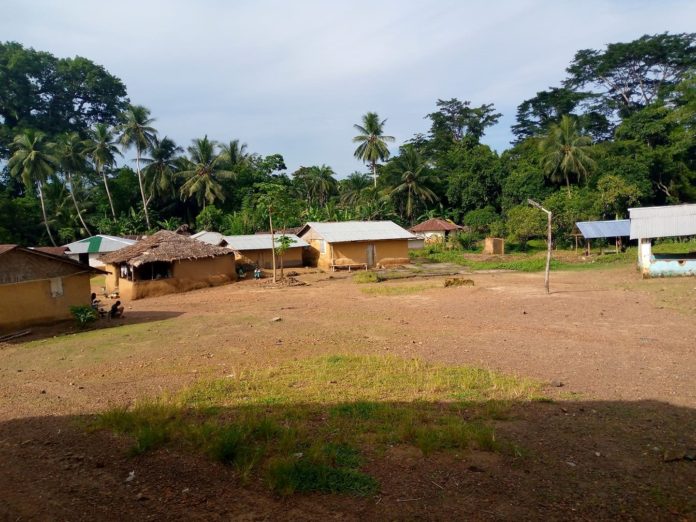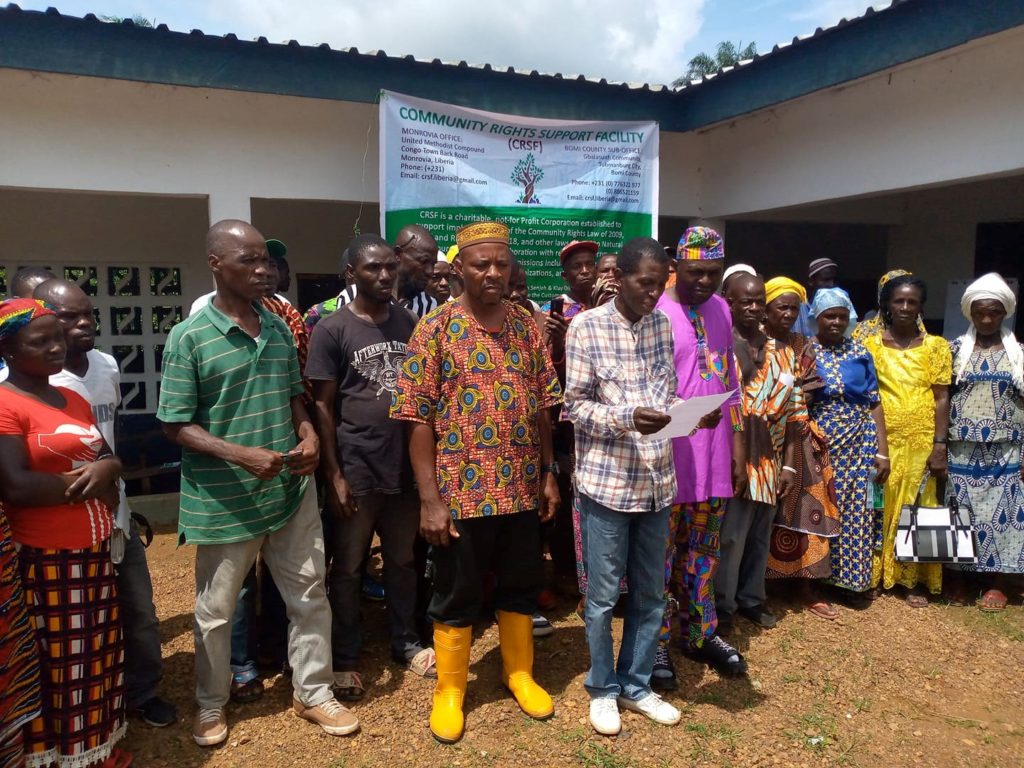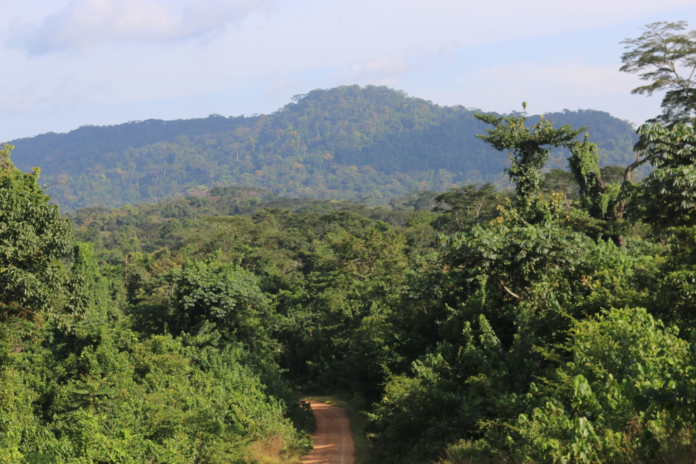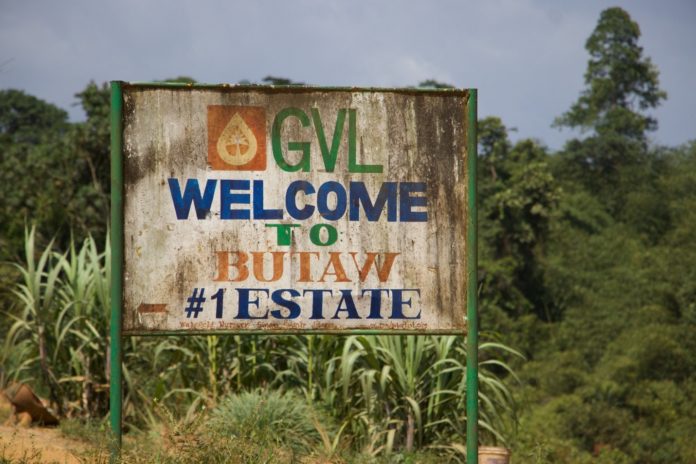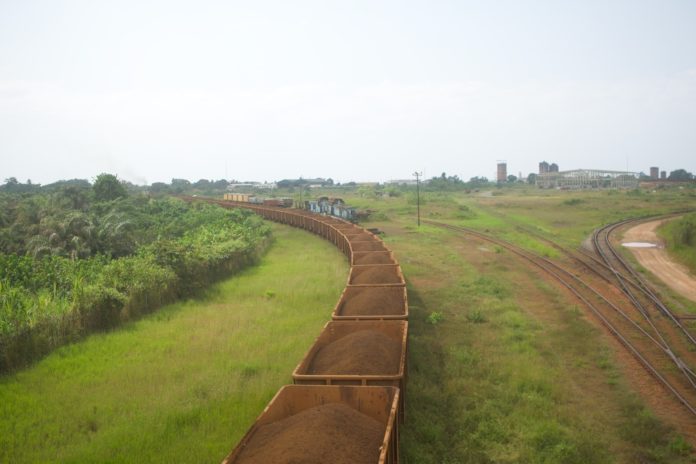Banner Image: A portion of the newly paved road in Vambo, Grand Bassa County. The DayLight/Ojuku S. Kangar, Jr
BY Ojuku S.Kangar
VAMBO, Grand Bassa County – An illegal memorandum of understanding that will see a company pave a dirt road through two townships in District #2, Grand Bassa County, in exchange for logs, is proceeding despite the disapproval of the Forestry Development Authority (FDA).
Last year, officials of the county signed the MoU with African Trades Entrepreneur Enterprise Incorporated. They agreed for the company to pave the 75-kilometer road through Vambo and Marloi and harvest logs within 1.5 meters on each side of the road. Representative Mary Karwor, Superintendent Janjay Baikpeh, District Superintendent Nancy Green, Commissioner Daniel Dayougar (Vambo) and Commissioner Amos Joe (Marloi) signed the MoU.
The FDA launched an inquest into the bogus deal as it breaches forestry laws and regulations. However, last month, the company and the county leadership moved ahead with the project, with about 60 percent already completed and the company poised to begin logging when the project reaches Noway Camp.
“The people of Vambo will pay for the dusty road construction with their natural resources,” Dayougar told The DayLight in an interview at his home in Jersey Town. “Operation should have started last year May and ended 2022 but did not due to Covid-19 outbreak. It starts 2021 and ends 2023.
District Superintendent Green told this reporter that there will be a mass meeting in the township to discuss the MoU before African Trade begins felling logs. That was exactly what Dayougar said July last year, which has yet to happen.
Vambo and Marloi are not authorized forest communities and cannot go into a logging agreement. Vambo has applied for community forest status but is still on boundary harmonization, the fifth stage of a rigorous, nine-step process to achieve that. Furthermore, African Trade has no record of logging in Liberia. The company gave away its only legal logging contract to Renew Forestry Group in Grand Bassa District B and C Community Forest, a deal that has plunged that community into continued chaos.
Atty. Gertrude Nyaley, the technical manager of the community forest department of the FDA, told the DayLight she knew nothing about the Vambo MoU. That was exactly what she said 10 months ago when FrontPage Africa broke the news of the illegal MoU. She said the FDA would lead a team of investigators to the township this week.
“This is an interesting development and speaks volumes to the continuous meddling in community forest activities by county authorities,” Nyaley said at the time. “This situation has plagued community forest activities across the country and complicates the work of the FDA.”
Baikpeh did not respond to email queries, follow-up messages and phone calls for comment on the matter. He did not also respond to Front Page Africa when they broke the story. However, he defended the bogus MoU on “Forest Hour” on Okay FM, arguing it would bring development to one of Bassa’s remotest communities.
Karwor also did not respond to mobile calls and follow-up messages on the deal. Effort by Varney Kamara, The DayLight’s legislative correspondent last week, did not also materialize. She did not also respond to FrontPage Africa last year when it sought her comment on the controversial deal.
Amos Sweegaye, African Trade’s CEO, eluded all attempts to be interviewed on the matter. He had agreed to speak to The DayLight on Friday at the FDA headquarters in Whein Town, Paynesville but called off the appointment in the last minute.
‘Dark Days’
Opposition to the MoU is rife in Vambo. Chiefs and elders said they did not make any inputs into the agreement and many have not even seen it. The parties to the deal agreed not to pay relocation package for residents whose houses and crops will be destroyed during the pavement.
“If the company feels it has government’s backing and look down upon us, it must enlarge the jail house at this time because many Vambo citizens will go to jail or die for their natural resources,” said Nathaniel Clark, the co-chairman of Vambo Development Association.

“We declared the deal bogus since last year because it has no royalty for the forest and its citizens,” said Ernest Gblorso, the chairman of the association. “The company will not dictate to us or force development on us.”
An attempt by workers of the company to go in the forest and start logging or mining without conveying a meeting with us… will be the beginning of dark days in Vambo territory,” said Elder Jacob Cee of Gbeewillie Town.
Dayougar said the people who are against the MoU “are those who are not residents or citizens of Vambo and do not want development.”
Vambo has no schools, clinics, safe drinking water and roads. People carry sick people and women in labor in hammock to the Buchanan highway, a five-hour walk. Farmers struggle to take the goods to the market. Many of the its children of school-going age have not sat in a classroom.
Some residents support the road construction, saying it will relieve their suffering.
“We are tired toting load on our heads every market day,” said Lacy Davis of Boe Town. “If the road had not come this year, I would have gone to my children in District #3 to live there because I am tired suffering.”
“We will ride regular motorbikes to go home because of the road,” said Ellen Brown of Togar Town. No more walking for hours.”

